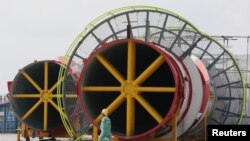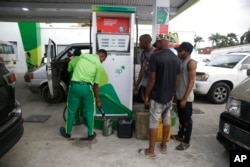A Nigerian rights group said this week it will file a lawsuit against the government for failing to repair the country's broken down oil refineries. In the wake of Russian oil being shunned over Russia's military action in Ukraine, pressure has been growing on Nigeria, Africa's largest oil producer, to increase its production and exports.
The Socio-Economic Rights Accountability Project, or SERAP, said its notice to authorities to probe allegations of mismanagement of funds approved for the rehabilitation, operation and maintenance of refineries is in the public's interest, and that authorities must prosecute anyone liable.
The group said in a statement that Nigeria had spent nearly $400 million for maintenance of the refineries between 2015 and 2020, with little impact. Nigerian refineries have been closed for more than a year, causing the country to rely heavily on imports for its energy needs.
SERAP also threatened to sue authorities if they do not respond to its notice by March 14.
SERAP officials were not immediately available for further comment on the lawsuit, but heavy sanctions on Russia's energy sector this month are shifting focus to other producers and exporters of crude oil.
Nigeria is Africa's largest oil producer, but experts say it may be too soon to celebrate the jump in oil prices.
"If we are still depending on the importation of fuel in Nigeria, it means that there will be a significant issue in terms of the cost of bringing in products into Nigeria, considering the level of inflation that the sanctions that have been imposed on Russia will cause globally, the level of economic shock," said Isaac Botti, a public finance expert.
This week, oil prices hit $130 per barrel, the highest mark since 2008, after the United States and European allies intensified their ban on Russian oil imports following Russia's invasion of Ukraine.
But prices fell Wednesday by more than 13 percent following a pledge by the United Arab Emirates to increase output in order to close the gap created by sanctions on Russia.
Botti said Nigeria had been struggling to stay afloat even before prices surged.
"Before even the crisis in Russia and Ukraine, Nigeria has been battling with internal crisis, particularly when it comes to the issue of supply of fuel for local consumption. Nigeria does not have functional refinery," he said.
SERAP also wants authorities to probe the import in January of more than 170 million liters of refined fuel from Europe by four oil operators.
However, the Nigerian National Petroleum Commission head, Mele Kyari, said during an International Energy Summit in Abuja last week that authorities are working to fix refineries to make the most of the current market opportunities.
"A minor disruption in supply can cause the chaos that you're seeing in our state. And that means that those redundancies must be settled," Kyari said. "As a country, we must address the issue of local production of finished petroleum products even in the short term, and this is what we're doing; we haven't achieved that, but you can see that the internal combustion engine challenge is a major social issue."
Russia exports about 7 million barrels of oil and gas a day, accounting for roughly 10% of global supplies.
Experts say the overall increase in oil prices is expected to boost oil revenue and increase foreign reserves for exporting countries, but they also say Nigeria first needs to resolve issues of local consumption.






